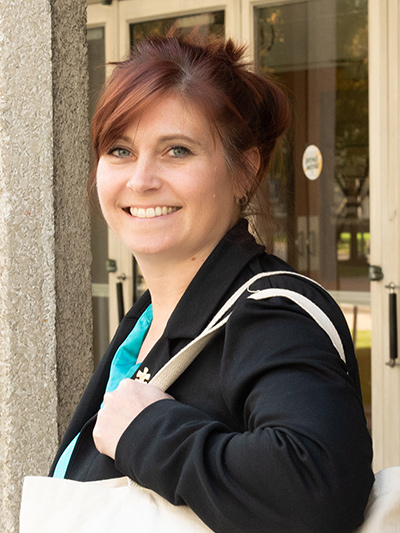Wayne State University College of Education receives Eugene Washington PCORI Engagement Award to improve coordination of care services for individuals with autism and developmental delays

Wayne State University’s College of Education was awarded $250,000 from the Patient-Centered Outcomes Research Institute (PCORI) to help individuals with autism and developmental delays obtain better access to services and treatment. Led by Krista Clancy, Ph.D., LP, BCBA, the Innovations in Care Coordination for Autism Spectrum Disorder and Other Developmental Delays (ICC) will convene a national group of stakeholders and provide them with training and support to encourage the collaboration, capacity building, knowledge acquisition and information sharing needed to facilitate future Comparative Effectiveness Research (CER) — or studies that compare care options to identify the most effective interventions for different patients and circumstances — that addresses options for care coordination. Stakeholders will include families of children with autism or intellectual or developmental disabilities from underrepresented and/or economically disadvantaged populations and community advocates for these groups. The two-year project began in October.
“Individuals with autism spectrum disorder can face significant social and behavioral challenges,” said Clancy. “With appropriate care coordination and early intervention, developmental outcomes can be improved. However, the number of children accessing early screening, comprehensive evaluation and early intervention services during the critical early years remains low, particularly among children from economically disadvantaged households and underrepresented groups. Clinicians and families must work together to improve approaches to care coordination and improve outcomes.”
Participants in the ICC stakeholder network will include a minimum of eight patient partners, eight providers, two payers and three community leaders. Project objectives include training patient partners and stakeholders to work as equal partners in research, with a focus on co-learning. Patient partners and stakeholders will obtain information about barriers that impact access to services and identify improved methods for promoting family engagement in early intervention services. The ICC stakeholder network will identify critical gaps in knowledge, identify high-priority topics and build strategic relationships for conducting future CER.
PCORI is an independent, nonprofit organization authorized by Congress in 2010 to fund research that will provide patients, their caregivers and clinicians with evidence-based information needed to make better-informed health care decisions. Eugene Washington PCORI Engagement Awards support projects that encourage active, meaningful involvement of patients, caregivers, clinicians and other health care stakeholders as integral members of the patient-centered outcomes research/comparative clinical effectiveness research enterprise.
“This project was selected for Engagement Award funding because it will build a community equipped to participate as partners in CER and develop partnerships and infrastructure to disseminate PCORI-funded research results,” said Greg Martin, PCORI’s acting chief engagement and dissemination officer. “We look forward to working with Wayne State University throughout the course of this two-year project.”
Wayne State University will contract with the Michigan Public Health Institute (MPHI), a nonprofit that seeks to advance population health through public health innovation and collaboration, to provide project management and consultation regarding stakeholder engagement, project evaluation and patient-centered outcomes research. Two MPHI staff members — Mathew J. Edick, Ph.D., research consultant, and Jane Pilditch, lead family partner — will work with Clancy to make up the lead research team.
Researchers hope this effort will shift research about the system of care for individuals with autism from a focus on provider-driven to patient-driven research and increase readiness to conduct family-centered CER. The project will also allow patient partners to contribute to a future research agenda for effective care coordination systems for children with autism. The research team believes prioritizing two outcomes will contribute to the development of high-impact, relevant CER questions.
The first identified outcome is to recruit a diverse group of stakeholders. The project will develop partnerships with advocacy organizations focused on the needs of underrepresented and ASD/IDD populations. Increasing the diversity of stakeholders that participate in research related to early intensive behavior intervention will help the team generate and implement strategies most likely to ensure stakeholder buy-in. Adrienne Bradley, a part-time faculty member in the college’s applied behavior analysis program and president of the Black Applied Behavior Analysts Inc., will be a member of the stakeholder network.
The ICC team identified additional participants for the stakeholder network and secured support from several organizations across the country that will assist with recruitment of additional stakeholders. They include the ABA Coding Coalition; Arizona ABA Association; Association for Behavior Analysis Task Force on Diversity, Equity, and Inclusion; Association of University Centers of Disabilities; Autism Center of Excellence at Western Michigan University; Autism Insurance Resource Center; Black Applied Behavior Analysts Inc.; Council of Autism Service Providers; Delaware Behavioral Health Consortium; Health Alliance Plan; Michigan Autism Council; Michigan Alliance for Families; Michigan Chapter of the Developmental Disabilities Council; Michigan Developmental Disabilities Institute; Michigan Special Education Advisory Committee; Michigan Department of Education; Rutgers University Center for Autism Research, Education, and Services; and University of North Colorado.
The second identified outcome is to collaborate with the stakeholder group to identify barriers to services for families who need a multidisciplinary model of care when many different systems of care and services must be accessed for optimal outcomes. This project will identify specific gaps in knowledge that act as a barrier in making treatment decisions for family partners and providers, and that may contribute to delays in screening, diagnosis and treatment for individuals with autism from underrepresented and low-income groups.
“Bringing families and other key stakeholders together at the beginning of the research process increases the likelihood that key outcome measures and current knowledge gaps in research that are most important to families will be identified,” said Clancy. “While outside the scope and timeline of the current project, the ICC team hopes our work will help more children with autism, especially those affected by poverty or from underrepresented populations, obtain earlier access to services, achieve better developmental outcomes and experience a higher quality of life.”